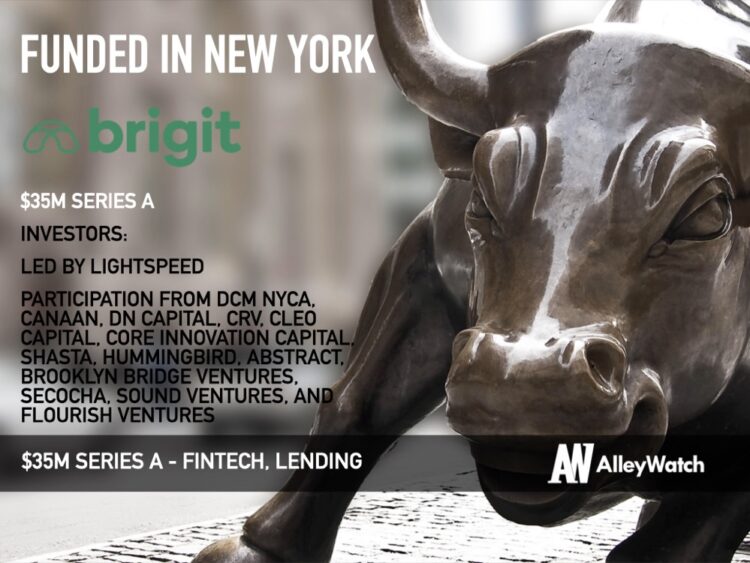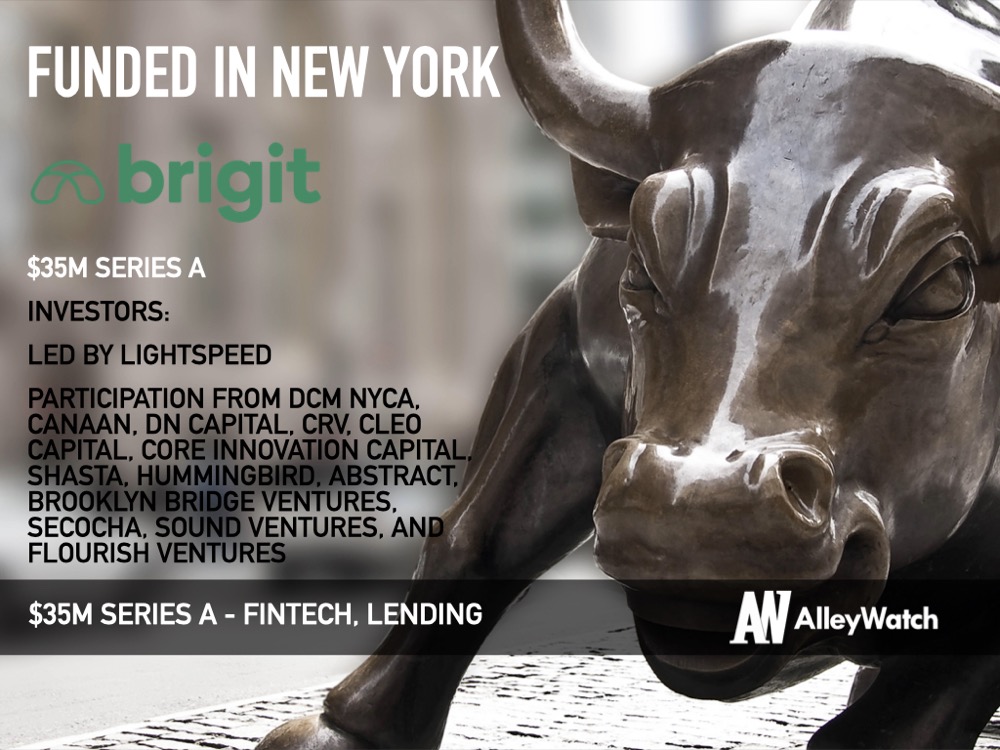The uncertainty of the pandemic has introduced financial uncertainty to millions of Americans. During these difficult times, budgeting and prudent financial management can help Americans get through this struggle as we try to return to normalcy. Brigit is a personal finance app that takes a holistic approach to managing financial health, providing provides a complete set of tools to help users understand and improve their financial situations. The freemium app provides access to educational resources, cash advances, and credit monitoring solutions for an added flat fee, unlike other sources of capital that charge onerous fees and rates, which often put people into more financial despair. On average, the use of the app saves users $500 per annum.
AlleyWatch caught up with Cofounder & CEO Zuben Mathews to learn more about the importance of financial literacy, the company’s future expansion plans, and latest round of funding, which brings the total funding raised to $38M.
Who were your investors and how much did you raise?
Brigit raised a $35 million Series A approximately a year ago, which was previously unannounced. The round was led by Lightspeed Venture Partners, with participation from DCM (our lead seed investor), Nyca, Canaan, DN Capital, CRV, Cleo Capital, Core Innovation Capital, Shasta, Hummingbird, Abstract, Brooklyn Bridge Ventures, Secocha, Ashton Kutcher’s Sound Ventures, and Flourish Ventures.
We’re most proud to announce that we’ve saved our members over $250 million in fees since our launch.
Tell us about the product or service that Brigit offers.
Brigit is a holistic financial health app helping every American build a brighter financial future. Our members benefit from a suite of transparent, fair, and simple tools to help them spend wisely, access emergency funds, earn extra income, and protect, monitor, and secure their credit & identity.
What inspired the start of Brigit?
Both my cofounder, Hamel, and I have had personal experience with financial stress — it’s what drove us to create the company. Hamel grew up in a low-income household in Lowell, Mass., and had a front-row seat to financial insecurity with members of his family suffering from financial stress.
When I came to this country for college, I had no credit score and thus no way of getting a credit card. I struggled with financial stress on the back of timing mismatches between when my bills were due and when I’d get paid from the multiple side jobs I was working. This timing mismatch not only made me rely on vending machines for meals but also caused me to pay over $1,000 in overdraft fees in my first year of college alone.
Once we realized over 100 million people in the U.S. live in similar circumstances, we wanted to leverage our professional experience in finance and technology to help solve the problem to reduce financial stress and improve financial literacy.
How is Brigit different?
We are different in every way including our product features, business model, and most importantly the way we think about our customers. Banks and other apps profit from their customers’ financial stress. They want their users to remain financially unhealthy because they make more money when their users struggle and borrow more.
We on the other hand believe in empowering our members. This is why we take a holistic approach at solving the financial health of our members and use technology to give meaningful insights at the right time, leading to better financial outcomes. We are helping our members manage their spending, making it easier for them to earn extra cash, and helping them avoid predatory fees. We don’t believe the problem starts and ends at providing advances alone.
Though that is needed from time to time, we want to make sure our members have additional tools that help them avoid borrowing in the first place, instead helping them save.
In addition, our business model is aligned with our users’ incentives to borrow less and save more. Unlike traditional other apps, banks, and lenders who profit off of people’s misfortune, Brigit’s company’s financials improve only as our members’ personal finances improve. We have a flat monthly subscription and we never charge any other fees including no hidden fees, late fees, instant transfer fees, interest, or bully people for “tips.”
 What market does Brigit target and how big is it?
What market does Brigit target and how big is it?
Brigit serves the 78% of Americans who live paycheck to paycheck and 90 million Americans who are thin or no file credit – an underserved segment of the population that has been disproportionately affected by the financial hardships brought on by COVID-19.
What’s your business model?
We have two membership options: the Free Plan and the Plus Plan ($9.99 a month). For alerts and insights into our members’ finances, personalized content, savings tips, and extra income opportunities, members pay nothing. For instant advance transfers, credit monitoring, and $1 million of identity theft protection, members can subscribe for $9.99 a month — and never pay a cent more.
How has COVID-19 impacted the business?
We serve a segment of the population that was already living under immense financial stress from their lack of money between paychecks, savings, and budgeting know-how before COVID-19. The pandemic exasperated this financial stress, as many American workers were left unemployed with nowhere to turn until they could receive government assistance.
To combat this economic shock, we rolled out personalized tools to help people manage their spending during the pandemic and budget better. We also created financial literacy content to help our members navigate this volatile and largely unpredictable economy, including information on lowering their bills. For example, we sent our members a script to help them negotiate with cell phone plan representatives for lower rates, plus the phone number they needed to call. For T-Mobile customers, we found that our prompt saved members an average of $19.85 per month after a 21-minute call.
Additionally, with nearly 20 million people losing their jobs at the initial peak of the pandemic, we created a tool to help our members earn additional income through side-gigs, work-from-home opportunities, and full-time jobs.
We also saw an uptick of identity theft during the pandemic for this segment of the population and, in response, rolled out $1 million of identity theft protection and credit score monitoring as a free service to our members.
What was the funding process like?
Luckily, we had developed some relationships with many of our Series A investors when we were first raising our Seed round, allowing us to run a very quick process. We were fortunate to have a term sheet on day one of fundraising and almost a dozen by the end of the week.
We found a terrific partner to lead our round in Jeremy Liew and Lightspeed, who’s experience helping build iconic consumer brands such as Snap and Affirm stood out to us. We also took the opportunity to surround ourselves with value-add investors such as Flourish (Omidyar Network) for their impact focus and Ashton Kutcher’s Sound Ventures for their growth expertise.
What are the biggest challenges that you faced while raising capital?
The biggest challenge was helping investors understand just how many people in the richest country in the world struggle with financial stress. We had to uncover the real America for investors and put them in the shoes of an overlooked, but massive, segment of the population.
Once we were able to convince the right investors to join us on our journey, we had to convince them to be flexible on their ownership targets so that we could accommodate more investors that add value.
What factors about your business led your investors to write the check?
First and foremost, our mission to help every American build a brighter financial future resonated with our investors. Once investors understood that we were helping our members save over $500 annually, they were able to grasp the magnitude of the impact we could deliver.
Investors also believed in our team’s ability to leverage our personal experience with financial stress to build products that would make a true impact and be aligned with our customers’ incentives, unlike the competition.
Separately, our team’s ability to utilize cash-flow data to build and personalize Brigit’s financial products also intrigued investors — as did our analysis of over 8 billion individual financial transactions to build our algorithms.
Additionally, the company’s growth was faster than many breakout consumer companies and our unit economics were strong, proving we had achieved product-market fit and were ready to scale.
What are the milestones you plan to achieve in the next six months?
Our company milestones are always aligned with the goal of improving our members’ financial health. As a result, we plan on providing our members with even more financial literacy content so they can budget better and save more. We also plan on helping our members stay on top of their credit scores.
What advice can you offer companies in New York that do not have a fresh injection of capital in the bank?
Our advice would be to make sure you understand your business in detail, communicate your overall vision effectively, and be able to explain how your work to date has laid the foundation for that vision.
Our advice would be to make sure you understand your business in detail, communicate your overall vision effectively, and be able to explain how your work to date has laid the foundation for that vision.
Where do you see the company going now over the near term?
Over the near term, we plan on expanding our product offering to help our members in a more holistic manner. We also plan on bringing on more senior leadership who can help us provide more value to our members and serve more people seeking to improve their financial health.
What’s your favorite outdoor dining restaurant in NYC
Hall – they are near our office, have some of the best Burgers in the city, and have been donating to NYC since the Pandemic. Please support them





